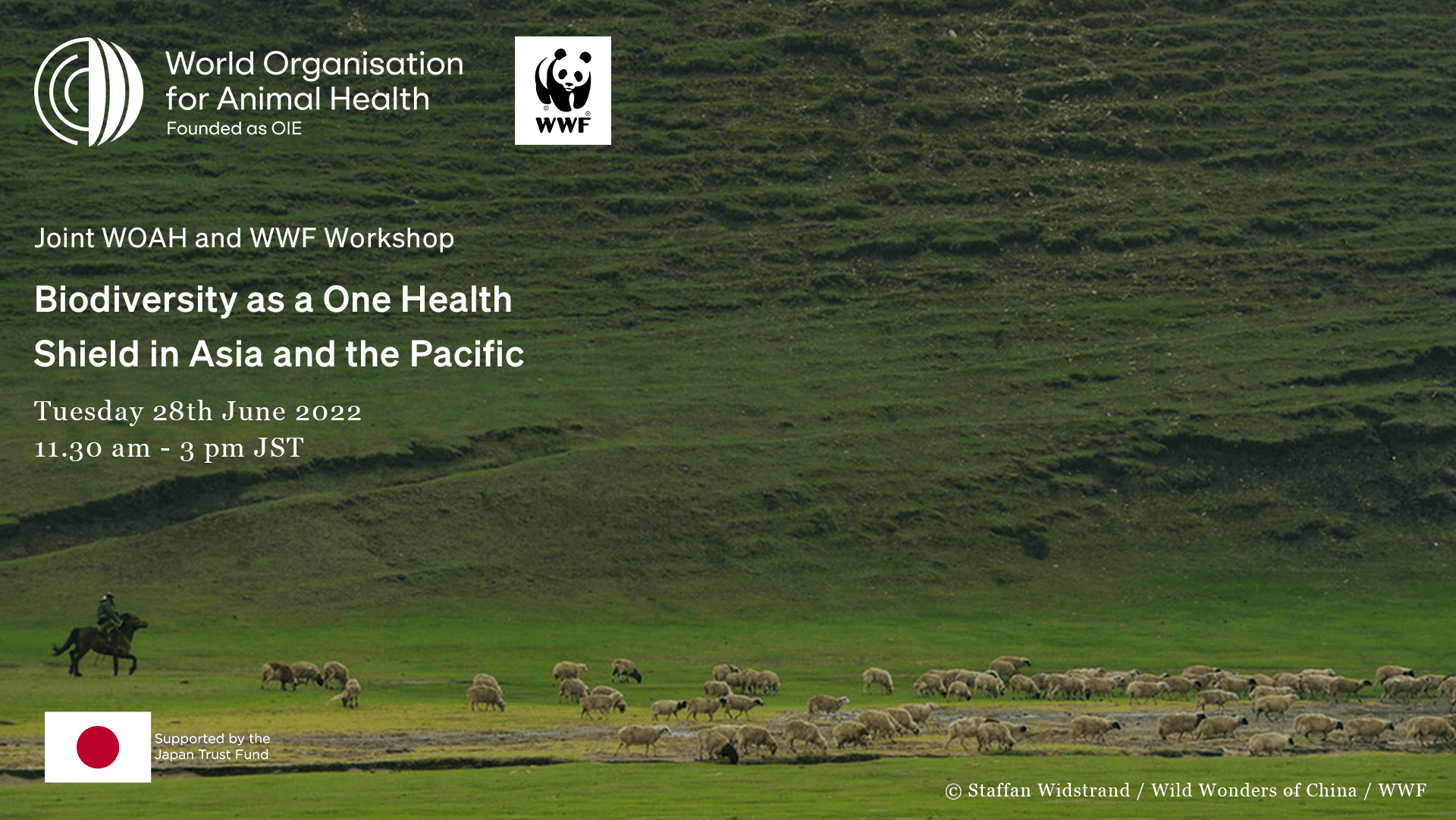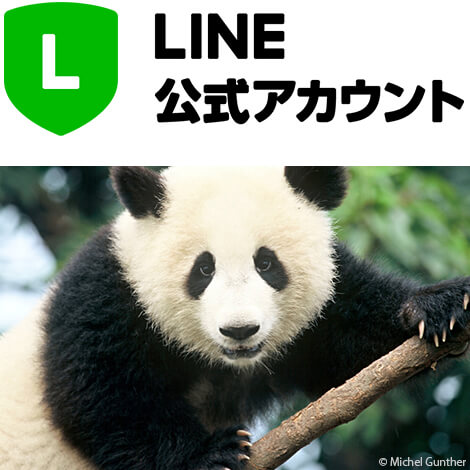Joint WOAH and WWF WorkshopBiodiversity as a One Health Shield in Asia and the Pacific
2022/06/14

Date: Tuesday 28th June 2022
Time: 11.30am –3pm JST
Location Online
Register Here
Langrage English
The World Organisation for Animal Health (WOAH) Regional Representation for Asia and the Pacific (RRAP) and the World Wide Fund for Nature (WWF) Japan are jointly organizing a workshop to share knowledge and promote discussion with wildlife health stakeholders in the region on the importance of biodiversity as a One Health shield to protect us all.
The health of ecosystems is vital for the survival of humans, animals, and plants. Activities like pollination by bats and bees, seed-dispersal by fruit-eaters, oxygen production, water supply and carbon capture by coral reefs and forests closely intertwine us with the environment. Healthy ecosystems have a full complement of the species that have evolved and co-exist to represent a specific ecosystem. Drivers of ecosystem degradation include many human activities and factors such as wildlife trade, deforestation, climate change, and certain farming and livestock management practices. Land use and development activities increase the proximity and increased interactions between humans, livestock and wildlife, which can facilitate disease spillover.
This workshop—organised by the WOAH RRAP jointly with WWF Japan—on 28th June 2022 will give an overview of biodiversity in Asia and the Pacific before discussing the positive effects of biodiversity on ecosystems health. The workshop will be interactive with participants, who can share their One Health solutions for challenges facing ecosystem health and formulate recommendations on working together in the future.
Agenda

Resources and further reading
• WOAH Wildlife Health in Asia and the Pacific
• OIE Wildlife Health Framework “Protecting Wildlife Health to Achieve One Health”
• WOAH Event website
• 人と動物、生態系の健康はひとつ ワンヘルスシンポジウム
• ASIA-PACIFIC COUNTER-ILLEGAL WILDLIFE TRADE HUB
Outcome
WWF Japan and WOAH RRAP held a workshop on June 28, 2022. The workshop was attended by about 100 participants from various industries (academia, IGOs/NGOs, local governments, and central ministries) as well as various countries and regions (South America, Europe, Africa, Oceania, Southeast Asia, and Japan). Active discussions took place between the panelists and participants.
This WS focused on the followings.
• Improve understanding of key drivers impacting wild animal diversity and ecosystem functions.
• Assimilate examples of positive effects of biodiversity on ecosystems health in the region.
• Discuss One Health solutions for challenges facing ecosystem health in the region.
As the keynote speech, Dr. Theresa Mundita S Lim, Executive Director of the ASEAN Center for Biodiversity, shared in her presentation about the current status of ecosystems in Southeast Asia.
Ecosystem health is an important component of One Health.
Dr. Bijaya Kumar Shrestha, WOAH Focal Point for Wildlife, Nepal, presented an example of the use of elephants for biodiversity conservation.
Ms. Anika Terrana, Director of Forests at WWF USA, shared the outcome of her publication, The Vitality of the forests, published in March 2022, that explains One Health's contribution to the forest sector.
One Health approach could provide us with solutions for challenges we are facing.
Mr Yoganand Kandasamy, Regional Lead for Wildlife and Wildlife Crime, WWF Greater Mekong (GMPO), Lao PDR gave his presentation on the current situation of wildlife trade and showed how importance to keep ecosystem health.
In addition, Ms Shalan Scholfield, Department of Agriculture, Water and the Environment, Australia shared practices in Australia regarding environmental biosecurity measures to deal with invasive alien species.
Finally, to discuss the future direction of the project, we focused on regional efforts.
Dr. Kouichi Goka, National Institute for Environmental Studies, Japan presented the importance of "one health" in biodiversity conservation.
Ms. Cecilia Fischer, Illegal Wildlife Trade Coordinator, Asian Development Bank shared perspectives on regional cooperation in Southeast Asia based on discussions at the Counter Wildlife Trafficking Partnership Forum and a subsequent survey.
The discussion structure highlighted on collecting the views of not only the presenters but also all the participants in the WS, and the recommendations from the WS were compiled with the cooperation of Dr. Nae Tanpradit, Mahidol University, Thailand and others.
Workshop recommendations
All stakeholders involved in activities related to biodiversity and ecosystem health in Asia and the Pacific
1. Enhance communication and collaborations among stakeholders across the region on conserving biodiversity and ecosystem health.
2. Promote activities on priority issues in the region, namely: climate change, invasive species, land use change/deforestation, and wild animal health.
3. Use the One Health approach more to support biodiversity.
4. Engage more with other groups—including hunters, remote communities, policy makers, private sector, and wildlife traders—to include them in discussions on biodiversity and One Health.
Educators, science communicators and academic researchers in Asia and the Pacific
1. Further share evidence-based knowledge from research activities on wildlife and ecosystems health with a wider audience.
2. Continue to build education efforts for the younger generation about the benefits and importance of biodiversity and ecosystem health.
WOAH and WWF in the Asia and the Pacific region
1. Continue to share the latest knowledge and guidance relating to biodiversity and One Health with a wider audience.
2. Advance networking in the region for stakeholders with an interest in biodiversity.
You can find the full document here.







